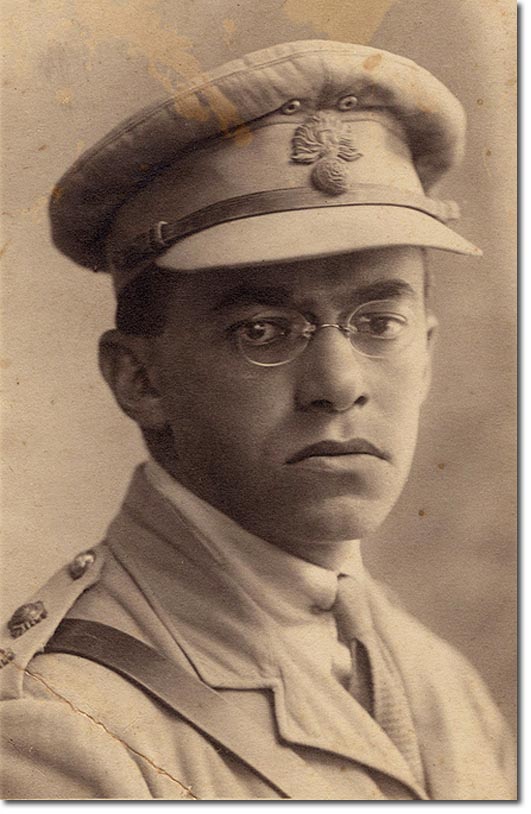|
|


|
|
Jabotinsky is better known as a political leader who was instrumental in the establishment of the State of Israel. He had many talents which included military leadership, and today he is remembered as a hero by many Israelis. There are streets named after him in most Israeli cities, however, he is less revered by Jewish exponents of left-wing political views.
He was born on 18th Oct 1880 as Vladimir Yevgenyevich Zhabotinsky in Odessa. He was a talented writer and became a journalist at the age of 16. The Kishinev Pogrom of 1903 prompted him to join the Zionist movement and he established the Jewish Self-Defence Organisation to protect Jewish communities in Russia from acts of violence. He learned modern Hebrew and took on the name Ze'ev which means Wolf. During World War I, he conceived the idea of establishing a Jewish Legion to fight alongside the British against the Ottomans who then controlled Palestine. In 1915, together with Joseph Trumpeldor, a one-armed veteran of the Russo-Japanese War, he created the Zion Mule Corps, which consisted of several hundred Jewish men, mainly Russians, who had been exiled from Palestine by the Turks and had settled in Egypt. The unit served with distinction in the Battle of Gallipoli. When the Zion Mule Corps was disbanded, Jabotinsky travelled to London, where he continued his efforts to establish Jewish units to fight in Palestine as part of the British Army. Although Jabotinsky did not serve with the Zion Mule Corps, Trumpeldor, Jabotinsky and 120 VMC did serve in Platoon 16/20th Battalion of the London Regiment. In 1917, the government agreed to establish three Jewish Battalions, initiating the Jewish Legion. As a lieutenant in the 38th Battalion Royal Fusiliers, Jabotinsky saw action in Palestine in 1918. His battalion was one of the first to enter Transjordan. He was at first appointed as liaison officer in Allenby's HQ but preferred to serve alongside the men. They were in the front line at Shechem in the hills of Samaria and first came under fire on 15th June 1918. He commanded a platoon that was sent out repeatedly on risky operations. At Abouein he and his men would be sent to occupy this area of no-man's land for a week at a time, it was a difficult and dangerous task. In August 1918 the battalions were sent to the Jordan valley which is purgatory in summer. No European troops were ever made to remain there for more than 2 weeks but these men endured 5 weeks there. Jabotinsky and his men were stationed at Mellahah, the most desolate and malaria-stricken spot in the entire Jordon Valley. Colonel Patterson wrote of him: 'He was an Inspiration to all ranks, and as an officer I would say that his courage, his loyalty and his devotion to duty were beyond all praise.' In August 1919, soon after he complained to Allenby about the British Army's attitude towards Zionism and the Jewish Legion, he was compulsorily demobilised. His appeals to the British government failed to reverse the decision, but in 1920 he was awarded an MBE for his service. Jabotinsky was an anglophile but his preference was severely tested by the British who repeatedly blocked his efforts. He was arrested after the 1920 riots in Palestine and accused by the court of being a Bolshevik despite his fierce opposition to communism and socialism. The British also prevented his return to Palestine in 1930 after he had visited South Africa. They also vetoed his attempt to organise a mass evacuation of Jews from Poland Hungary and Romania in 1936. The final straw was the restriction of Jewish immigrants to Palestine from Nazi occupied Europe. He then became involved with Irgun in a planned uprising against British rule in Palestine. He died of a heart attack in New York on 4th Aug 1940 and was initially buried there, but in 1964 he and his wife Anya were interred and taken to Israel where they were placed in Mount Herzl Cemetery in Jerusalem. Recommended Reading: The Life and Times of Vladimir Jabotinsky: Rebel and Statesman: The Early Years by Joseph B Schechtman (1986) |
Armed Forces | Art and Culture | Articles | Biographies | Colonies | Discussion | Glossary | Home | Library | Links | Map Room | Sources and Media | Science and Technology | Search | Student Zone | Timelines | TV & Film | Wargames